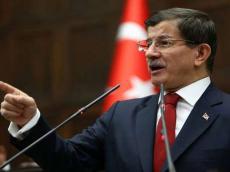|
|
TODAY.AZ / Politics
Turkey's Davutoglu expects more effort from OSCE MG for Karabakh conflict solution
20 April 2016 [14:07] - TODAY.AZ

By Nazrin Gadimova
The OSCE Minsk Group should take more efforts to resolve the Nagorno-Karabakh conflict.
Ahmet Davutoglu, the Turkish Prime Minister, made the remarks as part of a meeting of the PACE in Strasbourg on April 19.
Turkey, being a member of the OSCE Minsk Group, stands for the peaceful settlement of the long lasting Armenia-Azerbaijan conflict, Davutoglu believes.
"The recent situation on the contact line of the Armenian and Azerbaijani troops has once again shown that the status quo in the Nagorno-Karabakh conflict is unacceptable," he stressed.
Davutoglu also expressed concern over Armenia’s shelling of the territory of Nakhchivan Autonomous Republic of Azerbaijan.
Military operations launched by Armenia on April 2, were stopped on April 5 at 12:00 (UTC/GMT + 4 hours) with the consent of the sides and mediation of Russia. However, ignoring the agreement, the Armenian side started violating the ceasefire on the same day.
The conflict between the two South Caucasus countries began in 1988 when Armenia made territorial claims against Azerbaijan.
As a result of the ensuing war, in 1992 Armenian armed forces occupied 20 percent of Azerbaijan, including the Nagorno-Karabakh region and seven surrounding districts.
The 1994 ceasefire agreement was followed by peace negotiations. Armenia has not yet implemented four UN Security Council resolutions on withdrawal of its armed forces from the Nagorno-Karabakh and the surrounding districts.
Over the entire period of its existence, the OSCE Minsk Group failed to move forward in resolving the Nagorno-Karabakh conflict, although the interested parties had pinned great hopes on it. However, over the past two decades the hope for bringing the conflict to the final solution in fact disappeared as the group did take no efficient step or action to fulfill its mandate.
URL: http://www.today.az/news/politics/149909.html
 Print version
Print version
Connect with us. Get latest news and updates.
See Also
- 03 September 2025 [19:45]
China’s V-Day Parade for regional unity and global security - 03 September 2025 [15:24]
Armenian authorities approve highway weight station along Zangazur Corridor - 03 September 2025 [13:32]
Azerbaijan and Ukraine discuss steps to deepen strategic partnership - 03 September 2025 [13:11]
Azerbaijani Defense Minister visits Vietnam naval command headquarters - 03 September 2025 [12:30]
The last vestige of the Minsk group - 03 September 2025 [12:00]
Armenia ceases to be invisible - thanks to Azerbaijan - 03 September 2025 [11:42]
Criminal trial of former US Embassy employee begins in Baku - 03 September 2025 [10:07]
President Ilham Aliyev, First Lady Mehriban Aliyeva attend reception in honor of heads of state and spouses observing parade in Beijing - 02 September 2025 [15:00]
5th round of Brazil-Azerbaijan political consultations held - 02 September 2025 [12:59]
President Ilham Aliyev, First Lady Mehriban Aliyeva arrive in Beijing
Most Popular
 India has failed Armenia and the "Shanghai Spirit"
India has failed Armenia and the "Shanghai Spirit"
 Armenia ceases to be invisible - thanks to Azerbaijan
Armenia ceases to be invisible - thanks to Azerbaijan
 5th round of Brazil-Azerbaijan political consultations held
5th round of Brazil-Azerbaijan political consultations held
 Azerbaijan, Brazil hold inaugural meeting of Working Group on Trade and Investment
Azerbaijan, Brazil hold inaugural meeting of Working Group on Trade and Investment
 Special event 'From Garabagh along Silk Road ' held at Sea Breeze
Special event 'From Garabagh along Silk Road ' held at Sea Breeze
 Baku predict fate of Minsk Group back in 2020
Baku predict fate of Minsk Group back in 2020
 President Ilham Aliyev addresses SCO Plus meeting underway in Tianjin, China
President Ilham Aliyev addresses SCO Plus meeting underway in Tianjin, China
